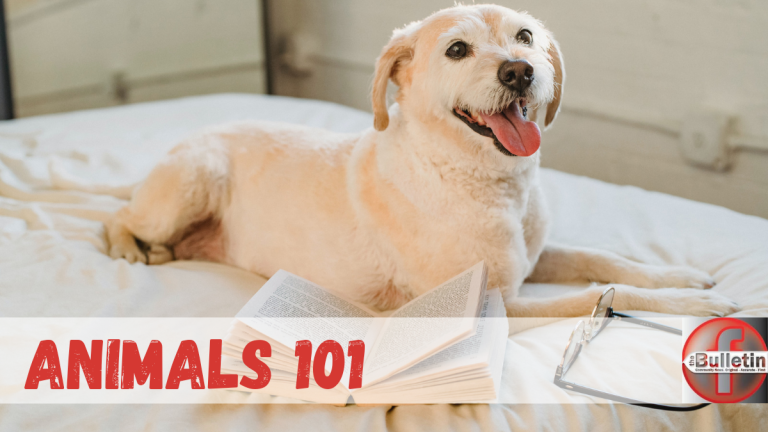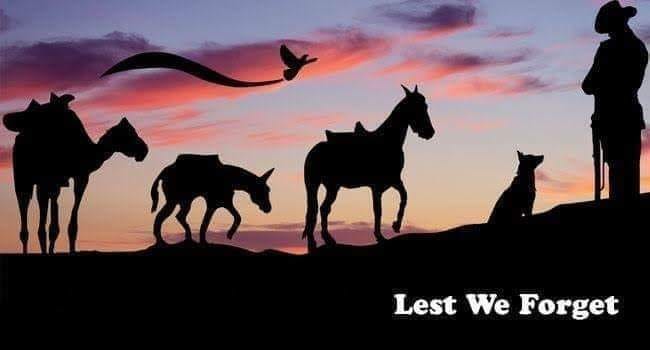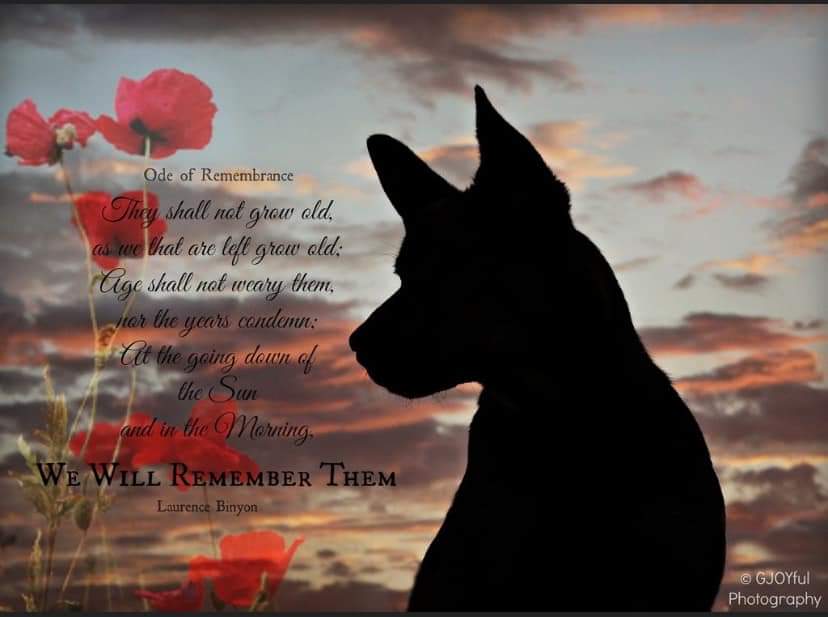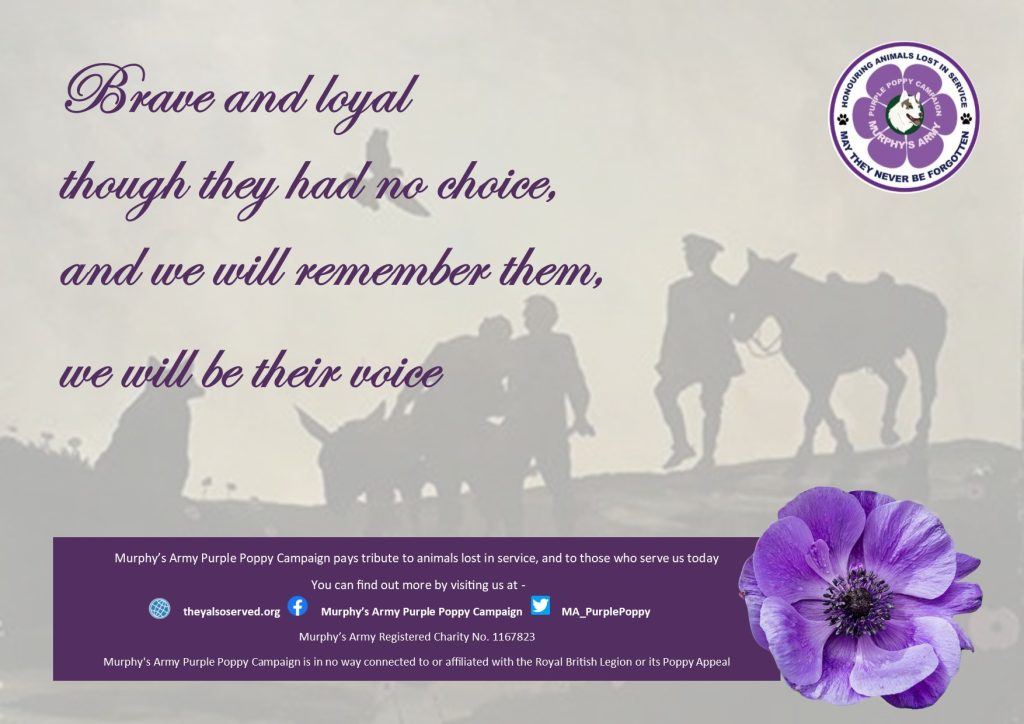
LET US HONOR THE SACRIFICE OF THE ANIMALS WHO SERVED IN WAR!
Remembrance Day was celebrated on Monday, November 11. It is a time to honor those who served and sacrificed in times of war, and this commemoration extends not only to the brave soldiers but also to the animals who had no choice but to obey the call. For them, the battlefield held no concept of duty or glory—only survival.

AN ARMY OF INNOCENTS
During World War I, countless animals were recruited into the military ranks. They were neither aware of their mission nor its purpose. Horses, donkeys, camels, and mules, integral to moving soldiers and supplies, endured hardships in conditions where humans themselves struggled to survive. They were overburdened and often pushed to their physical limits. Yet, day after day, they tread on through mud, rain, and gunfire, with no choice but to obey the commands given to them. Tragically, many did not make it back.
THE UNSUNG HEROES OF THE TRENCHES
Among the lesser-known contributions were those of pigeons and cats, often unacknowledged but essential to the soldiers’ survival. Cats, for example, played a surprising yet critical role by helping to control the rat population in the trenches. The infestation was severe, with rats not only contaminating food supplies but also spreading disease. For soldiers already fighting a merciless enemy, this was another struggle they could hardly afford. The cats kept the rats at bay, making life in the trenches just a little more bearable.
Pigeons, meanwhile, became lifelines in the most literal sense. Known for their remarkable homing ability, they were sent with messages across enemy lines and hostile territory, often dodging bullets and attacks from trained hawks meant to intercept them. In many cases, a pigeon’s safe arrival meant the difference between life and death for soldiers waiting on crucial intelligence. Their small wings carried immense responsibility, and many pigeons were awarded medals for their bravery and endurance.
FAITHFUL CANINE COMPANIONS
Dogs, too, played an indispensable role, a fact that often resonates deeply with those who have known the loyalty of a pet. Dogs served as messengers, alerting soldiers to incoming threats and even carrying first aid supplies to the injured. Some were trained as scouts, tracking enemy movements and helping locate wounded soldiers who were otherwise lost in the chaos. With their keen senses and unwavering loyalty, dogs braved dangerous terrains, always by their handlers’ side and willing to follow commands without hesitation, even if it meant putting themselves in danger. Dogs’ lives are still used today for security, police and military services, search, and rescue and they often pay with their lives.
A LEGACY WORTH REMEMBERING
The animals who served in wartime were no less heroic than their human counterparts, yet they did so without understanding the purpose of their actions. Unlike soldiers, they couldn’t refuse their assignments, nor could they comprehend the reasons for the turmoil around them. What they displayed was a purity of service—a dedication that came not from choice, but from instinct and loyalty.
As we remember the men and women who served, it is only fitting to also acknowledge the silent contributions of these animals who walked beside them. Many countries have erected memorials in honor of these animals, recognizing the sacrifices they made without ever truly having a say.
Let us honor the bravery and dedication of these animals. Let us remember that while they had no voice in the decisions that led them to the frontlines, their contributions were invaluable, and their sacrifices were real.

Also, read more about protecting your animals in hot weather.
EXPLORING ETHICAL DILEMMAS IN THE USE OF ANIMALS BEYOND COMPANIONSHIP
In this article, I not only want to honor those who served without a choice but also raise awareness of the many industries that use animals. While using animals in war may seem noble, as they serve alongside humans in dangerous situations, it raises ethical questions because animals cannot consent to such roles. They are subjected to fear, hardship, and the risk of losing their lives to save others, without any understanding or choice in the matter. Although their bravery is undeniable, it remains a profound ethical issue to place animals in positions where they may suffer or sacrifice their lives for human causes. True respect for animals might mean finding ways to protect life without requiring their unchosen service in human conflicts.
Although fewer animals are used in war today, many industries still use animals in ways that deny them autonomy or freedom. While some might justify using animals in war as a noble purpose compared to their use in the entertainment or beauty industry, we must recognize that animals in these industries always suffer without choice or benefit. The treatment of animals in these industries is frequently concerning, revealing a need for more ethical practices.
Here are just a few examples:
Factory Farming: Animals raised for food often endure overcrowded and unsanitary conditions, routine antibiotics, and sometimes inhumane slaughter methods, all of which compromise their well-being.
Fur Farming: Animals such as minks and foxes are confined to small cages for their pelts, and killing methods can be cruel, raising questions about the ethics of using animals for fashion.
Animal Testing: Though animal research may contribute to medical advances (highly debatable), concerns persist about their living conditions and painful procedures, especially given alternatives like in vitro testing. Read more on this topic here.
Entertainment Industry: Animals in circuses, zoos, and aquariums, face limited space and inadequate conditions, raising questions about their quality of life and the ethics of captivity for human amusement. Don’t be captured by captivity.
Tourism Industry: Practices like elephant rides or tiger petting subject animals to harsh training and unnatural living conditions, raising ethical concerns.
Captive Dolphin Facilities: Dolphins in shows or swim programs suffer from confinement that does not meet their physical or social needs, impacting their well-being.
Cruelty in Entertainment: Activities like dogfighting and cockfighting are explicitly cruel and illegal in many places, yet persist, causing extreme suffering.
Pet Breeding: Breeders always prioritize profit over animal needs. Bad breeding practices lead to a decline in health, genetic issues, behavioural issues, and add to shelter overpopulation.
Exotic Animal Trade: Illegal poaching and trafficking compromise the welfare of exotic animals taken from their natural habitats and kept in poor captive conditions. Exotic/wild animals do not belong in your home.
Fashion and Leather and Feather: Leather production involves ethical concerns regarding animal confinement and slaughter, as well as environmental impacts. Products that contain feathers also raise ethical questions. Read more on wearing it kind.
Horse and Dog Racing: Horses and dogs face issues like drug use, injury-related pressures, and grueling competition, with practices that prioritize profit over animal welfare.
To mention only a few………………..
Animals are born to live freely, not to serve human purposes. They are more than tools for our entertainment, convenience, fashion, or security. Riding animals, and using them in sports, circuses, aquariums, petting farms, animal testing, and even clothing production will cause suffering and deprive them of the natural lives they deserve. It’s time we rethink the role of animals in our lives and commit to ethical choices that honor their right to live freely and thrive. Let’s recognize animals as beings deserving of respect and compassion, not just resources to be used.
Efforts to address these issues are increasing, with organizations and activists pushing for better treatment and legislative changes. As awareness grows, consumer demand for ethical practices is driving positive changes and humane alternatives.

I SPOKE TO YOU IN WHISPERS
By Neil Andrew
I spoke to you in whispers
As shells made the ground beneath us quake
We both trembled in that crater
A toxic muddy bloody lake
I spoke to you and pulled your ears
To try and quell your fearful eye
As bullets whizzed through the raindrops
And we watched the men around us die
I spoke to you in stable tones
A quiet tranquil voice
At least I volunteered to fight
You didn’t get to make the choice
I spoke to you of old times
Perhaps you went before the plough
And pulled the haycart from the meadow
Far from where we’re dying now
I spoke to you of grooming
Of when the ploughman made you shine
Not the shrapnel wounds and bleeding flanks
Mane filled with mud and wire and grime
I spoke to you of courage
As gas filled the Flanders air
Watched you struggle in the mud
Harness acting like a snare
I spoke to you of peaceful fields
Grazing beneath a setting sun
Time to rest your torn and tired body
Your working day is done
I spoke to you of promises
If from this maelstrom I survive
By pen and prose and poetry
I’ll keep your sacrifice alive
I spoke to you of legacy
For when this hellish time is through
All those who hauled or charged or carried
Will be regarded heroes too
I spoke to you in dulcet tones
Your eye told me you understood
As I squeezed my trigger to bring you peace
The only way I could
And I spoke to you in whispers……
A Moment of Reflection
LEST WE FORGET– Let us remember their courage, their loyalty, and the countless lives they helped save. These animals may not have known why they were there, but they served faithfully. Today, we can repay that service by making sure their sacrifices are not forgotten and that we make ethical choices when it comes to our interaction with animals.
Join us again next week as we explore more on the topic of animals and how we can improve their lives.
WHEN YOU KNOW BETTER, DO BETTER!